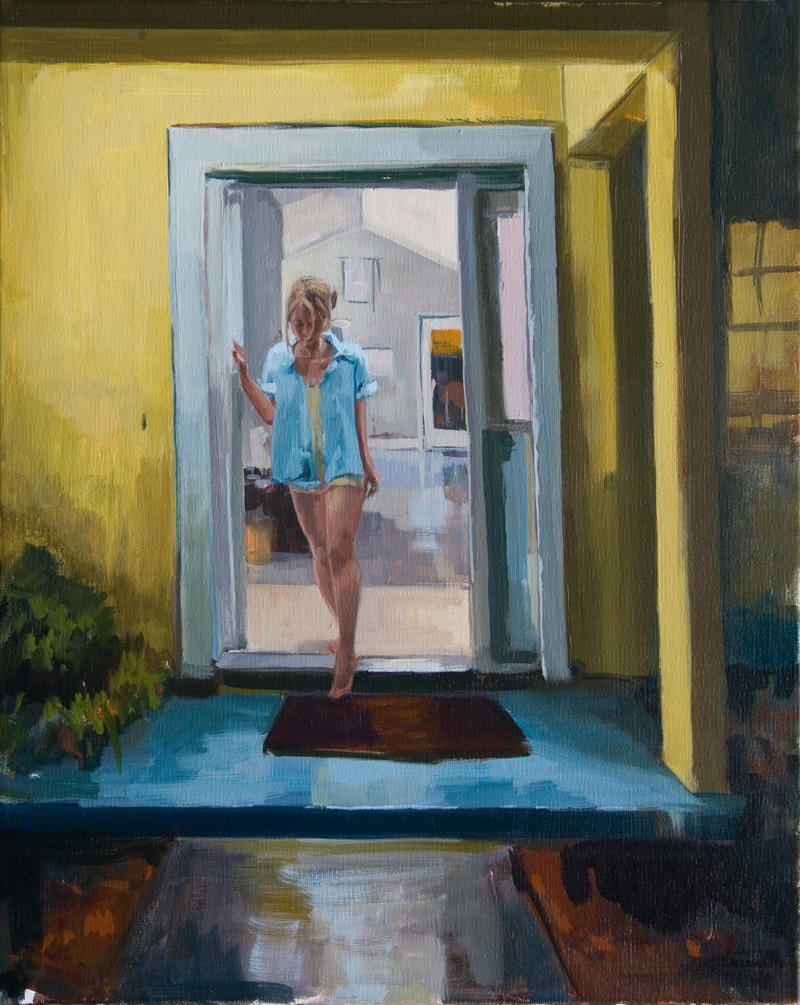By Jennifer Popa
Beneath the full moon, while I dream of magicians sawing ladies in half and warm tides cresting at my hip, I am eaten by a giant slug. At the edge of the woods, four sticky tentacles pat my feet, tasting them while I sleep, before moving to my knees, and then mashing my skirt. I wake by the time his gummy mouth reaches my middle. I jerk upright to object, politely of course. He retracts, spitting me out entirely, but in the night air my legs grow cold from the wet of his throat. I demure, run my finger along what I believe to be his lip, and ask him if it hurts to be eaten.
He assures me it won’t in his teasing sort of way, and I believe him. My belly percolates with anticipation at being eaten, at being seen, at being wanted by his noisy mouth. I lie flat, whisper my consent, and he begins again. I’ve waited for this. His mouth is earthy. I wonder if I taste interesting, like a wax apple or a discarded honey jar rimmed with ants.
He was wrong though. It does hurt. If only a little.
Once inside I am swaddled by the dim, and slick with a glop that plugs my nostrils and makes my dress a weighty second skin. While the swallowing left me a bit breathless with anticipation tingling along my torso, once inside I feel a little disappointed, possibly even sad. At first I see nothing, but can sense insects skittering at the periphery of my vision. I flop onto a tangle of dirty sheets atop a mattress. This is all he can offer me. Pressing my palms to the walls I feel cracked plaster and the flakes of peeling paint. Above my head is the erratic tick of a clock at the back of his throat. At least I think the clock is up. Directions are less clear from inside.
I trace the wall’s edge, fingering pockets of loose tissue and uncovering calluses in the strange crevices of plaster. I trip over debris: rotting branches of rosehip, a crumpled wedding gown, an empty wine bottle, an antique hair-comb with a missing rhinestone. Each clinks and shifts as he moves along. And while it’s not the best sort of place, I’ve heard of worse places. I remind myself I asked for this and there’s nothing to be done now. He opens his mouth wide to offer me gusts of air and sometimes he mutters catchy jingles, none of which I recognize, but I am charmed by his strangeness. He is kind. I know this because he goes to the sea so I can smell the fresh air and even swallows crabapples for me. I always offer thanks.
So I pick at the paint—a pukey-squash color chosen by the previous tenant. I wonder how long she was with him, but when I inquire about those who came before me he stops singing his jingles and goes silent. I stop asking.
I hang the wedding gown from a nail protruding from the wall and use the branches to beat the dust from it. I locate a squat table in the corner, flip it over, dust it with the skirt of my dress, and place the wine bottle atop with loose weeds that look sort of like flowers if you don’t look too closely. Lastly, I place the glittering comb in my hair.
I talk to him, tell him all my stories: about the beautiful bearded lady at the circus, the time I stole a pack of gum at the market, about the half-moon scar of dog teeth on my thigh. At first he listens, sometimes laughing politely but I wonder if he’s really hearing me. I ask him what he’s thinking but he never responds. The sound of his movement is an idling engine, or the soft hum of beetles braiding the air; sometimes it helps me sleep.
The trouble is, I grow bored talking to myself. He seems to have forgotten about me, or thinks I’m no longer worth the trouble. I wonder about the previous tenant, if he loved her, if she crawled her way out, or if he retched her into the air, ejecting her along with the rotten leaves and bric-a-brac. Eventually the crabapples slow until hunger wrings my abdomen, and I can’t even remember the salt of the sea air.
I am, in a word, lonesome.
I grow bolder, standing on the table while hurling barbed insults at him, and kicking at the walls of his belly. Though my feet are small, I know he senses each wallop as they catch his breath. Once I grow tired I’m apologizing and gently tapping morse code into his walls in the hopes he will stop, whispering how much I adore him even though we both know it’s not true.
It isn’t long before I can’t breathe; the air has turned thick. His mouth is only a sliver now, and his pace grows labored. Even for a slug he seems to have slowed. My pleading turns to hiccups and I long for my mother. No one will come looking for me, because they stopped coming around when I kept disappearing into the woods. My mother grew weary of my volume and nerve and we stopped pretending I would come home when she asked, because by then I’d made up my mind.
I wasn’t swallowed by accident. I wandered in the woods for months looking for him. When he stumbled upon the heap of my body I wasn’t dreaming so much as feigning sleep. On the insides of my eyelids I watched him approach, imagined his want for me, the way I would be devoured. I had worn perfume and selected my prettiest dress for just such an occasion. I lied perfectly still. It wasn’t so much an accident as a consumption of my own design, so that I might be kept, be his. An offering of sorts. I gave him permission to cinch my edges before I should meet the next man. One I could never imagine, though he could.
In this narrow canal my remorse tastes of old pennies. I attempt to strategize a way out the door-less entrance of the mouth when suddenly he goes still, stopping entirely. He slumps forward, the clock ceases its erratic ticking, his hum comes to its conclusion, and the faint sliver of moonlight at his mouth disappears—a trap door snapping shut.
I wait for him to begin again, wonder if he’s met another girl—one with a prettier dress who talks a little bit less—but he remains rooted in this spot. I holler “hello” but my only response is the pealing echo of my own voice. So I wait and count Mississippis. It isn’t long before I realize the walls are turning cold and the air has a tinge of vinegar.
He has died. He has died with me alive inside him.
I try not to panic, but my breath begins to fray. I pinch then caress his flank in search of an escape hatch, fingering the cell’s geography for an exit at the backend. I am cramped, and my muscles pump and strain against the fleshy cage. I shift his body along ever so slightly, but only budge him in minute fractions. I am exhausted with the effort of carrying both of us along. In order to move through this life I would have to drag him with me, hefting his sloppy flesh in my arms, but he is too cumbersome to warrant the effort.
I long for the comfort of my shadow and want for more teeth so that I might bite my way out. I want something other than the greasy damp of a stairwell, to breathe something other than the stale breath folded into the rubbery skin of a balloon. The walls begin to cry, seeping with a bile that trickles into my hair and curls along my jawbone.
I topple the table and kick at its leg until it loosens, wiggling it like a stubborn tooth. I am panting by the time I separate it from the tabletop. At the joint the wood splits and splinters into woody fjords. With my new weapon I prod my palm along the wall, tapping before I strike. I begin to beat the walls of his belly. It takes all my effort to create a puncture. I heave all my weight behind the table leg but when I break through it’s only the smallest of scrapes and the trickle of bile turns into a slosh. The gastric juices overwhelm me, splashing at my feet and rising along my calves. Part of the plaster cracks overhead and very nearly caves in on me. The wedding gown drops from its nail.
So I kneel in the slop, and mouth the words for all the prayers I’ve never said. Like the animal that I am, I’ll drown in the waters of this body come morning. I never bothered to learn to swim.
Before I was eaten I had often come to imagine him in the darkness of my bedroom, which is a kind of knowing in its own right. His was a mouth I readily placed myself inside, his body one I have curled into a thousand times within my imagining. Each time I folded myself into him it was a request for the merging dissolve between his skin and mine, and had we been knit together, I would have counted myself lucky for the blessing. Even knowing that he was never mine, not really.
But this wasn’t love; it was consumption. It was a desire to feel the weight of his body upon my skin, the crush of his mouth at my middle, a want to be held by someone, anyone.
The trouble is when someone dies and you didn’t love them you spend the rest of your days condemning your own impotent heart and polishing his ghost’s sheen. But what is one to do when the loss of an almost-beloved is not a wound but a sigh, a welcomed reprise from a lured though eventually unwanted lover? It’s easy to fashion counterfeit truths rather than comb the knots of this story when he’s long absent and I do not miss him. His corpse is the one I am forever dragging, parading around the walls of Troy. It is ragged and cumbersome, and in my wake I carve rivers into the earth.

Jennifer Popa earned her Ph.D. in English at Texas Tech University and her MFA in Creative Writing at the University of Alaska Fairbanks. She now works as an Assistant Professor and is revising a collection of short stories and puttering her way through a novel. Some of Jennifer’s most recent writing can be found at The Florida Review, West Branch, Ninth Letter, and Sundog Lit. She can be found at www.jenniferpopa.com.

